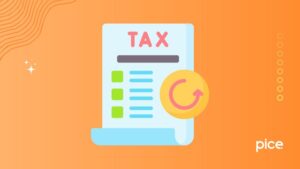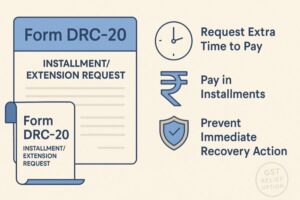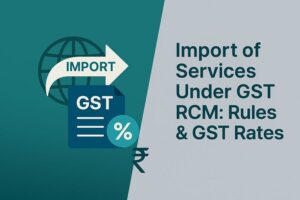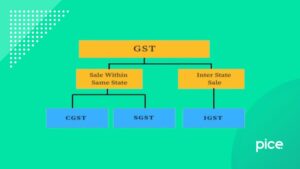What Is Input Tax Credit Under GST & How to Claim it?
- 31 Aug 24
- 11 mins
What Is Input Tax Credit Under GST & How to Claim it?
- What Is Input Tax Credit?
- Input Tax Credit in GST
- Eligible and Ineligible Input Tax Credit
- Input Tax Credit on Capital Goods
- How to Claim Input Tax Credit Under GST?
- Conditions to Claim an Input Tax Credit Under GST
- Time Limit to Claim Input Tax Credit Under GST
- Types of Taxes Under GST
- How Does Input Tax Credit Work Under GST?
- Reversal of Input Tax Credit
- ITC Reconciliation
- Documents Required for Claiming ITC
- ITC on Job Work
- ITC Provided by Input Service Distributor (ISD)
- ITC on Transfer of Business
- Conclusion
Key Takeaways
- Understand Eligibility: Ensure ITC claims are strictly for business purposes, not personal or exempt supplies, and backed by valid invoices.
- Timely Compliance: File monthly returns, reconcile with supplier details, and pay suppliers within 180 days to avoid ITC reversals and penalties.
- Capital Goods: ITC on capital goods is only claimable if used for taxable supplies and not depreciated for tax purposes.
- Document Requirements: Maintain all relevant documents like valid tax invoices, debit notes, and bills of entry for successful ITC claims.
- Regular Reconciliation: Match ITC details with supplier returns regularly to ensure accuracy and prevent discrepancies in GST filings.
In today's tax structure, understanding the intricacies of Input Tax Credit (ITC) is essential as it allows businesses to reduce the tax they pay on their outputs by the amount of inputs. However, claiming ITC would require a thorough understanding of the framework.
In this blog, we will discuss how to claim input tax credit for multiple tax periods and provide insights into this mechanism. Whether you are a tax professional or a small business owner, you can maximise your ITC claims effectively.
What Is Input Tax Credit?

Input Tax Credit is set off against the purchase of raw materials, goods and services which deal with manufacturing purposes. It helps in avoiding the cascading effect of tax, minimises tax burden and guarantees a seamless flow of credit to the system of Goods and Services Tax (GST). By claiming credit for the amount of GST paid on purchases, businesses can significantly reduce their tax liabilities.
Input Tax Credit in GST
When a person purchases any good(s) or service(s) for business purposes, he has to pay GST. Simply put, this is an Input Tax Credit. One can claim GST Input Tax Credit from the payable tax after the fulfilment of certain conditions by the buyer. The conditions are in tandem with the pre-GST regime, with the exceptions of a few.
Eligible and Ineligible Input Tax Credit
Not all ITC claims are eligible as per the GST provisions. Let us look at some of the input tax credits that are ineligible:
- Payment of GST on the purchase of motor vehicles or other conveyances is ineligible for ITC claims. If the purchase is for personal use, one cannot claim credit under GST. ITC is applicable only for business purposes, such as, for transportation of goods and passengers.
- Payment of GST by a non-resident taxpayer on goods and services for business purposes is ineligible for an ITC claim. However, for the goods on which interstate GST is applicable, one can claim ITC on the tax.
- ITC claims for GST on membership fees for clubs, fitness centres, beauty treatment products, health services and outdoor catering services do not meet the eligibility criteria. Only when used for making an outward supply of the products, it is considered eligible.
- One cannot claim ITC against payment of GST on purchases for non-business (personal) purposes, or their employees’ personal benefits like travel concession.
- GST on goods that are lost, stolen, destroyed or disposed of in any which way, does not qualify for ITC claims.
- The GST that you pay for travel benefits to employees on vacation are not eligible for an ITC claim.
- Goods and services on which tax is payable under the composition scheme are not eligible as well.
Input Tax Credit on Capital Goods
Under the GST regime, taxpayers enjoy the benefit of input tax credit on capital goods. It allows them to claim the tax that they pay for purchasing capital goods for their business purposes. Such goods include machinery, vehicles, equipment and so on.
There are a few conditions that need to be met in order to claim input tax credit on capital goods. We will have a look at some of those conditions below:
- You cannot claim ITC on capital goods if they are solely used for exempt or personal purposes.
- Taxpayers must not claim the tax component of the capital goods as depreciation as per the Income Tax Act, 1961.
- The person must reduce the ITC on capital goods by 5% per quarter. The term begins from the date of invoice to a life span of five years.
- The person has to capitalise the capital goods in the accounts books. Treating them as business expenses will make them ineligible for ITC claims.
These conditions make sure that the claimant for ITC on capital goods is for nothing but taxable supplies. Claiming ITC for any other purpose apart from furtherance of business is restricted under GST.
How to Claim Input Tax Credit Under GST?
To claim an Input Tax Credit under GST, a person needs to follow this step-by-step claim process:
- The person has to file a monthly return in Form GSTR-3B. Along with his input tax credit details, he has to declare his output tax liability.
- He must match the input tax credit details with that of the suppliers.
- In case of any discrepancy, it needs to be rectified in the following month’s return.
- The person has to pay any excess input tax credit with penalty and interest, depending on the situation.
By following the rules and regulations for claiming ITC, taxpayers can enjoy the benefits of GST and improve the profitability of their businesses.
Conditions to Claim an Input Tax Credit Under GST
There are certain conditions that need to be fulfilled by buyers with GST registration to claim ITC. Let us discuss the conditions laid down in Section 16 of the CGST Act:
- ITC claims are only valid if the purchase of goods or services is for business purposes. Purchases for personal consumption or exempt supplies are not eligible for ITC claims.
- Buyer must be able to produce the tax invoice or debit note that authenticates payment for the purchase.
- The supplier has to file the tax invoice or debit note in Form GSTR-1. It also has to appear in the buyer’s GST return form.
- Provisional ITC claims are no longer available from 1st January 2022 under Section 16(2)(aa). This implies that the reported amount of ITC in GSTR-3B will be a total of the actual ITC. Therefore, a regular matching of the purchase register or expense ledger with the GST return form is mandatory.
- The buyer must furnish the GST returns in Form GSTR-3B.
- ITC will be allowed for availment only after the receipt of the last lot or instalment by the buyer.
- The buyer must pay the supplier within 180 days from the date of invoice. If he fails to, the government will receive the ITC, along with interest payable as per Section 50. The buyer can reclaim the ITC after payment to the supplier.
- ITC will not be allowed if the buyer claims depreciation on the tax component of the purchase of capital goods.
- The buyer must claim ITC on a tax invoice or a debit note of a financial year within the time limit under GST.
- Common credit of ITC must be split as it deals with selling both exempt and taxable supplies.
Time Limit to Claim Input Tax Credit Under GST

The buyer has to claim ITC against an invoice or a debit note either by 30th November of the following financial year or within the date of filing the annual tax returns in form GSTR-9 of that financial year. Whichever of the two dates is earlier, the ITC has to be claimed by then.
Types of Taxes Under GST
There are four primary types of taxes under GST. Read on to learn more about the different types of taxes:
- Integrated Goods and Services Tax (IGST): It is levied on transactions across state borders.
- Central Goods and Services Tax (CGST): This type of tax is levied by the Central Government for supplies within the state.
- State Goods and Services Tax (SGST): The State Government collects this tax for intra-state supplies.
- Union Territory Goods and Services Tax (UTGST): This tax applies to supplies in union territories.
GST works on the principle of making taxation seamless by alternating multiple indirect taxes with a single unified method. This lessens the cascading of taxes and encourages GST compliance.
How Does Input Tax Credit Work Under GST?
The Input Tax Credit (ITC) is a benefit, exclusive for businesses that are registered under the GST Act. This includes manufacturers, suppliers, e-commerce operators, etc. It helps them claim a reimbursement for the taxes they have paid on their purchases for their respective businesses. This, in turn, reduces their GST liability. The Input Tax Credit mechanism ensures business compliance, thus simplifying the taxation regime applicable to businesses across various sectors.
Reversal of Input Tax Credit
Reversal of Input Tax Credit refers to the process of adding the credit of inputs utilised earlier to the output tax liability. This makes the earlier claimed ITC null and void. Depending upon when the ITC is reversed and the reverse charges, interest payable may also apply.
ITC Reconciliation
The ITC claimed by the buyer must match the details specified by the supplier in his GST return. If the transaction details do not tally, both the buyer and the supplier will be informed of the discrepancies after GSTR-3B is filed.
Documents Required for Claiming ITC
Let us go through all the documents that are required to claim the Input Tax Credit:
- Valid tax invoice used by the supplier
- Debit note issued by the supplier to the buyer
- Bill of entry
- Issue of invoice under special circumstances. For instance, the bill of supply issued instead of a tax invoice in case the amount is less than ₹200. A special invoice is also issued when the ITC is reversed according to the GST rules.
- An invoice or credit note issued by the Input Service Distributor (ISD) as per GST.
- A bill of supply which the supplier of goods and services issue.
ITC on Job Work
In situations where the principal manufacturer sends the goods to a job worker for further processing, the principal manufacturer can opt for claiming input tax credit against the purchase of goods sent on job work. The only condition here is that the job worker must send back the goods by 1 year to the principal manufacturer. In the case of capital goods, the time period extends up to 3 years.
ITC Provided by Input Service Distributor (ISD)
The Input Service Distributor (ISD) is mostly the head office or the registered office of the registered person under GST. ISD collects all the ITC claims on all the purchases made by the person and distributes it all to the respective recipients under different heads like CGST, IGST or SGST/UTGST.
ITC on Transfer of Business
This is applicable when a business is transferred to or merged with or amalgamated with another business. In such cases, the transferor will have available input tax credit. The transferee will eventually get the ITC at the time of the business transfer.
Conclusion
Now that you are aware of how to claim input tax credit, ensure timely payment of invoices to prevent reversals. Accurate ITC calculations not only enhance financial efficiency but also professional handling of ITC and optimise your tax liability.
💡If you want to pay your GST with Credit Card, then download Pice Business Payment App. Pice is the one stop app for paying all your business expenses.
 By
By 















